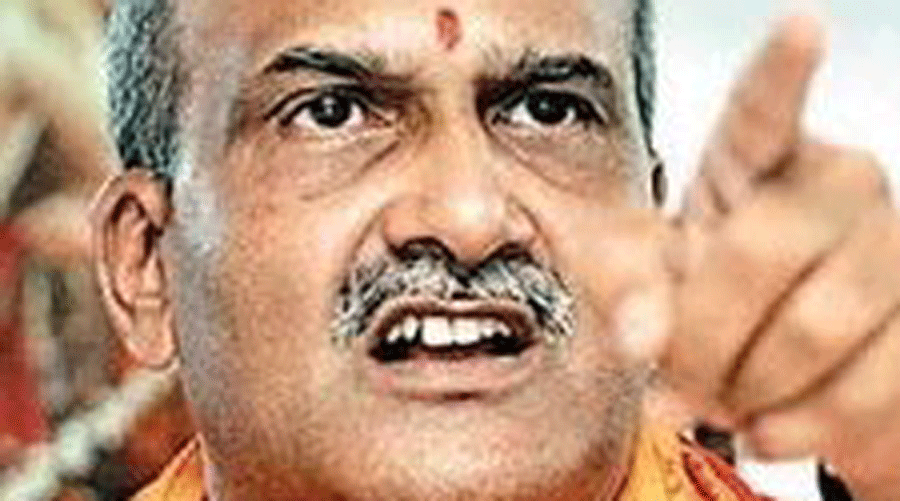An influential Sangh parivar outfit in Karnataka has decided to go on a statewide protest against the use of loudspeakers in mosques by playing bhajans five times a day in tandem with namaz.
The Sree Ram Sena, one of the most influential Sangh groups in the state, on Thursday gave an ultimatum to the government to ensure all mosques unplug their loudspeakers by May 1 or be prepared to face the “protest” from May 9.
Sena chief Pramod Muthalik told a news channel in Mangalore, Dakshina Kannada district, where the outfit has considerable clout, that he meant business this time.
“There has been no response from the authorities or the police in spite of filing several complaints. We want all mosques to stop using loudspeakers from May 1 or face our protest in the form of bhajans and chants of Om Nama Shivaya five times a day (at the time the azaan is sounded by mosques),” he said.
The Sree Ram Sena’s ultimatum resembles the one in neighbouring Maharashtra where Raj Thackeray’s Maharashtra Navnirman Sena has threatened to play the Hanuman Chalisa outside mosques using loudspeakers for azaan.
Muthalik also warned of “trouble” if anyone tried to stop the Sree Ram Sena’s protest.
He urged the Karnataka BJP government to replicate the “example” set by Uttar Pradesh, Madhya Pradesh, Gujarat and Delhi, referring to the bulldozer drives against those who threw stones at Hanuman Jayanti processions.
“I don’t know why everyone is scared.... If they (Karnataka government) have any shame, they should take strong decisions like Yogi Adityanath in UP, or MP, Gujarat and Delhi. Doesn’t the BJP have any guts in Karnataka?” Muthalik asked.
The Sangh parivar organisations, including the Sree Ram Sena, have been pointing to a 2005 Supreme Court order against the use of loudspeakers, while ignoring the fact that it applies to every place of worship and events and not just mosques.
Maulana Mohammed Maqsood Imran, the chief imam of Juma Masjid in Bangalore, iterated his stand that the court order is not only for mosques. “The Supreme Court order applies to every place of worship, including mosques, churches, gurudwaras and temples. It is not only for mosques.”
He noted that the majority of the mosques in Karnataka have complied with the decibel levels prescribed by the court that cited the Noise Pollution (Regulation and Control) Rules, 2000. More than 10,000 of the 12,000 mosques in the state have already been fitted with decibel-level controllers costing around Rs 10,000 each, he said.
The court order prescribed acceptable decibel levels for 10pm to 6am and 6am to 10pm.
Sree Ram Sena state general secretary Anand Shetty disputed the cleric’s argument that a majority of the mosques are fitted with decibel-level controllers with pre-set volumes for nights and daytime.
“Why should we repeat our demand if we are not hearing the azaan played through loudspeakers, especially the pre-dawn prayer around 5am? They have every right to pray. All we are asking for is to unplug the loudspeakers,” he told The Telegraph.
When told that the Supreme Court judgment applied to all places of worship, including temples, and they could be violating the order by playing bhajans five times a day, Shetty put the ball in the court of Muslims. “We won’t have to use loudspeakers if they stop,” he said.
Karnataka has of late witnessed a series of communally sensitive developments ranging from a ban on the hijab in classrooms to the prohibition of Muslim vendors at temple festivals to calls to boycott halal food. Little has been done by the government to reign in such hate campaigns.











